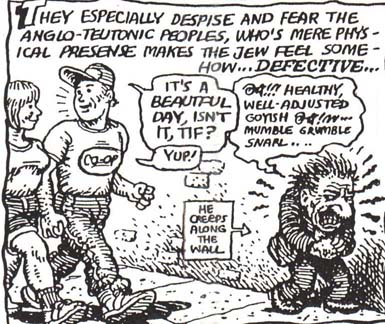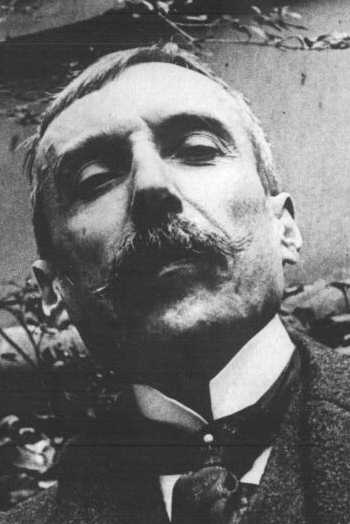The Website of Carlos Whitlock Porter
PORTUGAL'S GREATEST NOVELIST PREDICTS HOAXOCO$T
"In England, as in Germany, the Jews abound, influencing opinion through the newspapers which they own (among others, the Daily Telegraph, one of the most important papers in the kingdom), dominating trade through their banking houses and at times even governing the State. Here, certainly, we are far from unleashing a national hatred, a social persecution of the Jews, but there are sufficient symptoms that the heavy involvement of the Jews, of an Israelite state within the Christian state, is beginning to exhaust English patience.
"In tolerant, wise Germany, after Hegel, Kant, and Schopenhauer, we are going to see a real persecution of the Jews, a good one, just like the old days, in which they threw the rabbi's books and the rabbi himself into the very same bonfire, exterminating doctrine and indoctrinator on the same pile of faggots.
"But what is the origin of this hatred of the Jew? The reason for the increasing anti-Semitic fury is simply the growing prosperity of the Jewish colony, a relatively small colony, made up of barely 400,000 Jews, but which, through its activity, its pertinacity, its discipline, is competing triumphantly against the German bourgeoisie.
"High finance and small business are also in Jewish hands. It is the Jew who loans to states and princes. It is he to whom the small proprietor mortgages his lands. In the liberal professions, the Jew absorbs everything. He is the lawyer with the most cases, the doctor with the most patients. If there are two shopkeepers on the same street, a German and a Jew, the son of Germany is bankrupt after a year, and the son of Israel has a carriage! This became even more pronounced after the war [the Franco-Prussian War of 1870-71]. The good German could not tolerate the spectacle of the Jew getting fat, enriching himself, glittering brilliantly, while he, loaded down with military glory, must emigrate to America in search of bread.
"But if the wealth of the Jew
irritates him, the ostentation with which the Jew uses his wealth drives him
insane with fury. On this point, I must say that the Germans are right. The
ancient legend of the Jew, shrunken, emaciated, crook-backed, slinking along
the wall as closely as possible, casting stealthy distrustful glances from
between half-closed eyelids, belongs to the past.

"The Jew today is fat. He carries his head high, has an ostentatious paunch, and fills the street. It is necessary to see them in London, in Berlin or in Vienna. In the smallest of things: entering a café or occupying a seat in the theatre, they have an arrogant, ostentatiously wealthy air which scandalizes. The spectacular pomp of parvenu Solomons offends contemporary taste, which is sober. They always talk in loud voices, as if they were in a conquered country. In a restaurant in London or Berlin, there is nothing more intolerable than the Semitic cawing. They cover themselves with jewels, the harnesses of their carriages are pure gold, they love gross luxury. All this is irritating.
"But worse yet, in Germany, is the skilful plan with which they fortify their prosperity and guarantee their luxury, so skilfully that it smells of conspiracy. In Germany, the Jew, slowly and surreptitiously, has taken over two great social forces, the Stock Exchange and the press. Almost all the great banking houses are possessed by the Semite. This is how he makes himself invulnerable to attack. So, that not only does he expel the Germans from the liberal professions, humiliating him with his glittering opulence and dragging him about, dependent upon his capital; but, the supreme injury, through the voice of his newspapers, the Jew orders the German about, telling him what he must do, how he must be governed, and whom he must go to war against!
"All this would be tolerable if the Jew merged with the indigenous race. But no. The Jewish world conserves itself in isolation, compact, inaccessible and impenetrable. The formidable walls of Solomon's Temple, which were torn down, continue to form a barrier of obstacles around him. In Berlin, there is a real Jerusalem, which is invulnerable. There they take refuge with their God, their books, their clothing, their Sabbath, their language, their pride, their coldness, enjoying the gold and despising the Christians. They invade German society. There they wish to glitter and to dominate, but they do not allow the German to gain even a toehold in Jewish society. Among themselves, they help each other like kings, giving each other millions, but they begrudge the starving German even a crust of bread. They pride themselves, like insolent coquettes, in setting themselves apart from the rest of the nation in everything, from their way of thinking to their manner of dress. Naturally, such an accentuated exclusiveness is interpreted as hostility and repaid with hatred.
"But all of this is the fight for existence. The Jew is the strongest, the Jew triumphs. The duty of the German should be to use his muscles, to sharpen his intellect, to make an effort, to push himself forward and be the strongest in turn. But he doesn’t. Instead, miserably, like a coward, he turns to the government, presenting petitions on great rolls of paper, so that the Jew may be deprived of his civil rights, because the Jew is rich and the Jew is strong."
From Eça de Queiroz, in Cartas de Inglaterra, a collection of essays published in
1877-1882. Eça de Queiroz (pronounced Essa de Kay-ROSH) is generally considered
the greatest novelist in the Portuguese language, and served as Portuguese
consul to Newcastle, England, until his death in 1900. His books have been translated into English
and German under various titles, such as THE MAIAS, THE CRIME OF FATHER AMARO,
THE CITY AND THE MOUNTAINS, THE ILLUSTRIOUS HOUSE OF RAMIRES, COUSIN BASILIO,
etc. If they can be obtained in English, probably the best introduction to his work would be several of his short stories: THE ECCENTRICITIES OF A BLONDE-HAIRED GIRL (a masterpiece of short-story writing by any standard); THE HANGED MAN (a horror story with supernatural and religious overtones, in a very convincing medieval setting); and CIVILIZATION (a hilarious lyrical satire on the uselessness of modern gadgets and over-educated people).
THE CITY AND THE MOUNTAINS, available in English, first translated by South African poet Roy Campbell , is essentially a serious novelization of CIVILIZATION.
Queiroz also predicted "desperate
revolt" in Ireland with about 40 pages of detail, and a "Holocaust of Jews" in an 1887 short story called THE RELIC [in English translation only; the exact quote is "não lamentes as fogueiras de Moloch; has-de ter fogueiras de judéos"; a "fogueira" is a bonfire or a burning at the stake, but a "fogueira de Moloch" could be translated as "holocaust" in the Biblical sense. He did not use the word "Holocausto" with capital H in Portuguese: a perfect example of the problems involved in trying to prove things with translated documents].
Translation and notes by Carlos W. Porter
Note: Many of the greatest masterpieces of Portuguese literature, including several works by Queiroz, have been produced in the form of very popular, high-budget, television programmes in Brazil, with up to 140 episodes in a single series: very high quality stuff, too. For an example, click here (available from amazon.com but without subtitles). You can't even buy this in Portugal.
Under the dictatorship the Portuguese promoted their own culture. Today, many of the best films they ever made are no longer available and have never been reissued (such as Camões, with Antonio Vilar).This is equivalent to the English never reissuing a classic film on the life of Shakespeare.
The Eccentricities of a Blonde-Haired Girl has been turned into a very mediocre film, modernized, by a modern director, while The Crime of Father Amaro has been turned into a real stink-o, absolutely terrible, available in English, again, modernized and set in Mexico. Queiroz deserves better.
click to enlarge
"...Cohen was a Jew and a banker. The Marquis didn't like Jews in general, but nothing was quite so offensive to taste and to reason as the banker species. He could understand the footpad lurking in the pine forest; he could accept the communist risking his skin behind the barricades -- but the monied men, the So-and-Sos & Co., these made him ill... a beardless youth with a sly, hard eye, who already had the look of a lender at thirty per cent..."

MADE IN RUSSIA - THE HOLOCO$T
Return to ARTICLES PAGE
Return to CONTENTS PAGE
